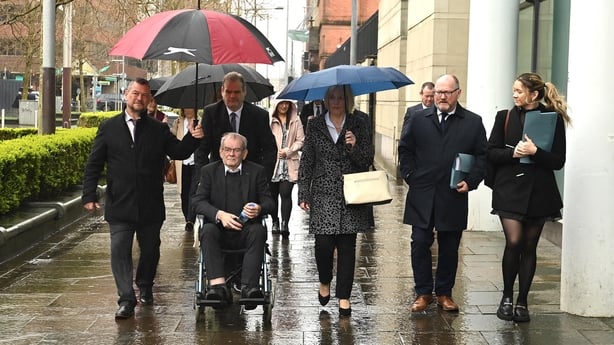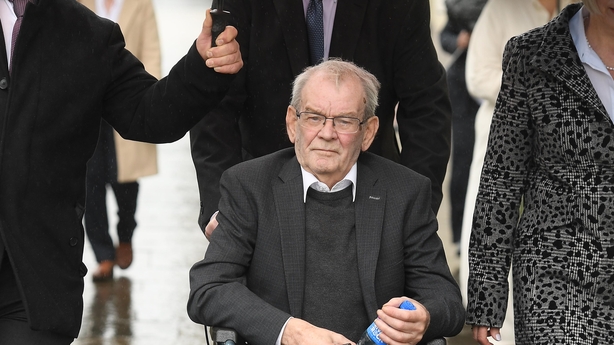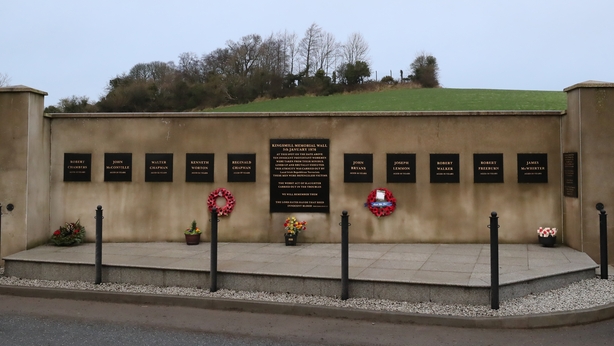A coroner in Belfast has said the Provisional IRA lied about its involvement in one of the worst atrocities of the Troubles, the murders of 10 Protestant workmen in Kingsmill in south Armagh in 1976.
Relatives of the victims and the sole survivor of the atrocity have called on the British government to hold a public inquiry to establish the truth about what happened.
They said the findings of an inquest delivered today had failed to answer many of their questions and concerns.
The level of revulsion at the murders of 10 Protestant civilians was so great the IRA tried to cover up its involvement.

Twelve workmen were ordered out of their minibus near Kingsmill on the evening of 5 January 1976.
A Catholic was singled out and told to run and was chased down the road by two members of the gang.
Gunmen then opened fire with automatic weapons, before finishing off the victims with single shots as they lay on the ground.
Ten of the 11 Protestants died.
No one has ever been convicted in connection with the attack.
The killings were claimed by a group called the South Armagh Republican Action Force.
Delivering the findings of the eight-year inquest into the killings today, Coroner Brian Sherrard dismissed that claim.
The coroner said the claim of responsibility was a lie.
He said the overtly sectarian attack had been carried out by members of the IRA, acting with the authority of the organisation's ruling army council.
Mr Sherrard said ballistic tests linked the ten weapons used that night to a series of other IRA attacks.
He said the workmen had been targeted because they were Protestants, and for no other reason.

Alan Black survived the attack, despite being shot 18 times.
He sat in the public gallery with relatives of some of the victims, people who had been his friends.
Afterwards he expressed frustration and disappointment that some intelligence information had been withheld from the inquest by the British government.
"I'm still searching for the truth," he said.
"And I am so disappointed with this inquest. I mean, at every turn of the way they've hidden behind national security.
"Now, these murders happened 48 years ago. What on earth is national security, hiding behind national security? How can it be compromised by murders that happened 48 years ago?
"Like, it just beggars belief. We're not anywhere near the truth."

The relatives say a public inquiry is their only hope of finding answers to questions that remain, including allegations that at least one member of the IRA gang was an informer - a claim the coroner said was without foundation.
The coroner also said there was no evidence of intelligence information that could have prevented the attack.
Solicitor Barry O'Donnell, acting for the relatives, said he will be writing to Northern Secretary Chris Heaton-Harris about the issue.
"We believe that the public inquiry is the next stage in order to progress this matter, this matter isn't over, this is unfortunately part of another journey," he said.
Coroner Sherrard said there had been a glaring omission during the inquest, a lack of disclosure from those responsible for the deaths despite numerous appeals for information.
In a comment clearly aimed at Sinn Féin, he said there had been no recognition from the perpetrators or their political representatives of the "utter wrongness" of an attack which had devastated so many lives.
In a statement afterwards, Karen Armstrong, a sister of one of the victims, John McConville, said the relatives were disappointed but not surprised that the IRA had not co-operated.
"They were not prepared or honourable enough to confront their barbaric actions in the court room. This represents the blatant disregard they have to truth recovery. We hope that this will be noted and considered by Sinn Féin," she said.
"The Kingsmill massacres is but one further example where the British government is not prepared to deal with republican collusion, for obvious political reasons, in the same way that they deal with loyalist collusion."
In a joint statement, the families of Alan Black and John McConville said that during the course of the inquest which began in 2016 "our questions have not been answered and our concerns have grown".
They listed several concerns including the original RUC investigation, which they said had failed in following basic potential lines of inquiry.
While the Coroner said he was grateful for assistance from the Irish authorities, the family statement was highly critical of the Irish Government.
It said that despite an assurance of full disclosure, the Irish Government had to be coerced and legal action threatened against it to participate in the inquest process.
The statement said the Irish Government role in not actively pursuing suspects has never been examined, and that the Republic "became a place where many terrorists suspected to have been involved in Kingsmill lived freely and in peace."







